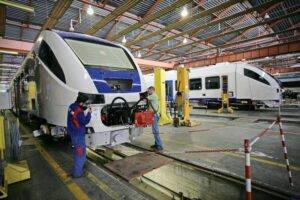Ministers are in last ditched negotiations with Alstom in a bid to prevent the closure of the iconic Derby train manufacturing facility, a move that could result in the loss of thousands of jobs across the industry.
Alstom, the French conglomerate that acquired the Litchurch Lane factory from Bombardier during the pandemic, is considering relocating production to Poland or India unless the government provides assurance regarding new train orders.
With current workloads at the plant coming to a standstill and the commencement of new train projects for the HS2 high-speed line delayed, over 1,300 workers at Derby have already been notified of potential contract terminations.
Alstom is on the brink of unveiling Adessia, a cutting-edge commuter train manufacturing platform capable of producing battery and hydrogen-powered rolling stock. These innovative trains are slated to replace Aventra trains manufactured by Derby for various railway networks, including London’s Elizabeth Line and Overground networks, South Western Railway, and West Midlands Railway.
However, despite months of negotiations with Transport Secretary Mark Harper, Alstom remains apprehensive about the lack of progress. Nick Crossfield, Alstom UK’s managing director, emphasized the significance of their next-generation trains for both Derby and the UK rail sector. He underscored the urgency in creating certainty for staff and suppliers, stressing the need for collaboration with the government.
While Alstom seeks commitments from the Department for Transport (DfT), the department remains hesitant to provide assurances for future work at Derby.
In a statement, the DfT emphasized the importance of rail manufacturing in bolstering the UK economy and enhancing passenger services. However, they refrained from committing to Alstom’s demands, stating ongoing engagement with the company regarding the future of its Derby site.
The Railway Industry Association has sounded alarms, warning that prolonged delays in new train orders jeopardize the entire sector. They urge ministers to break free from the historical boom-and-bust cycle plaguing the industry, emphasizing that indecision could result in diminished service quality and increased costs for passengers.
Read more:
Crisis talks to save historic Derby rail plant from closure

